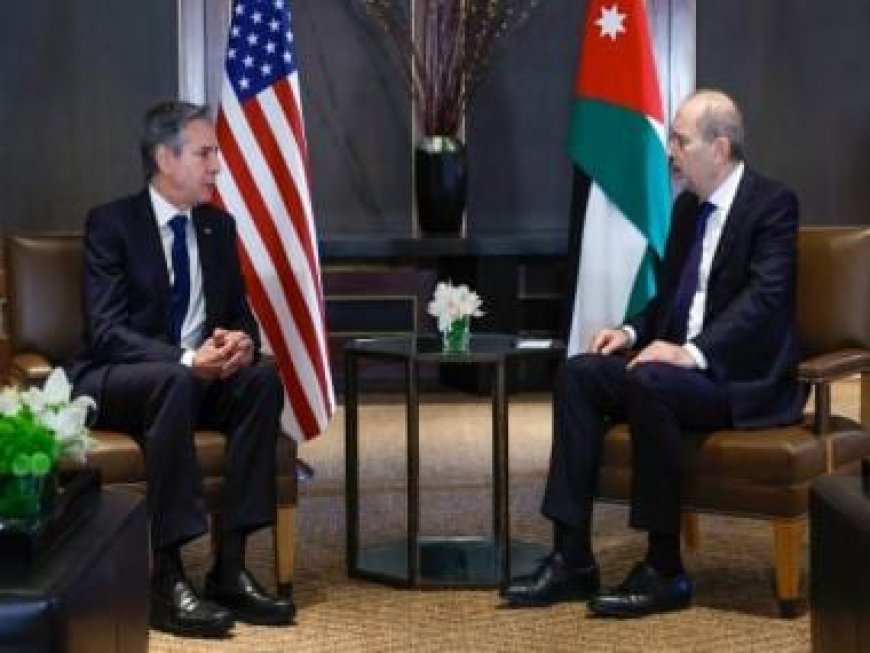Blinken meets Jordan's king and foreign minister on Mideast push to keep Gaza war from spreading
Blinken meets Jordan's king and foreign minister on Mideast push to keep Gaza war from spreading

US Secretary of State Antony Blinken met with Jordan’s king and foreign minister on Sunday and toured a World Food Programme warehouse in Amman as part of an urgent Middle East diplomatic trip to prevent Israel’s assault on Hamas in Gaza from expanding.
On his fourth visit to the region in three months, Blinken emphasised the importance of Israel adjusting its military operations to reduce civilian casualties and significantly increase the amount of humanitarian aid reaching Gaza, as well as the importance of developing detailed plans for the territory’s post-conflict future, which has been decimated by intensive Israeli airstrikes and ground offensives.
Following a day of talks with Turkish and Greek leaders in Istanbul and Crete, Blinken met with Jordan’s King Abdullah II and Foreign Minister Ayman Safadi on Sunday, seeking buy-in for US efforts to calm resurgent fears that the three-month-old conflict will engulf the region, increase aid deliveries to Gaza, and prepare for the eventual end of hostilities.
Jordan and other Arab governments have been harshly critical of Israel’s conduct and have refused to publicly endorse long-term planning, stating that the violence must stop before such conversations can take place. They have been calling for a quick cease-fire since mid-October, when civilian deaths began to rise dramatically. The US has instead called for specific, short-term “humanitarian pauses” to allow assistance to enter and civilians to reach safety, but Israel has refused.
Blinken also had a tour of the World Food Program’s Regional Coordination warehouse in the capital of Jordan, where relief supplies are being loaded onto trucks and transported to Gaza via the Kerem Shalom and Rafah borders.
The UN Security Council adopted a resolution on December 22 demanding an urgent boost in supplies. The US has been pressuring Israel for weeks to let more food, water, gasoline, medication, and other supplies into Gaza. Israel opened Kerem Shalom three weeks ago, providing a second entrance point for supplies into Gaza in addition to Rafah.
Still, the rate of trucks entering has not risen significantly. This week, an average of around 120 trucks a day entered through Rafah and Kerem Shalom, according to U.N. figures, far below the 500 trucks of goods going in daily before the war and far below what aid groups say is needed.
Almost the entire population of 2.3 million depends on the trucks coming across the border for their survival. One in four Palestinians in Gaza is starving, and the rest face crisis levels of hunger, according to the U.N.
More than 85% of people in Gaza have been driven from their homes by Israeli bombardment and ground offensives. Most live in U.N. shelters crowded beyond their capacity, in tent camps that have been sprung up, or on the streets. The few functioning hospitals are overwhelmed with the wounded as well as patients amid outbreaks of disease, as sanitation systems have collapsed.
In Greece on Saturday, Blinken said his trip would be dominated by “not necessarily easy conversations” with allies and partners about what they are willing to do “to build durable peace and security.”
Blinken’s visit comes as developments in Lebanon, northern Israel, the Red Sea and Iraq have put intense strains on what had been a modestly successful US push to prevent a regional conflagration since Hamas attacked Israel on Oct. 7, and as international criticism of Israel’s military operation mounts.
From Jordan, Blinken will travel to Qatar and the United Arab Emirates on Sunday and Saudi Arabia on Monday. He will then visit Israel and the West Bank on Tuesday and Wednesday before wrapping up the trip in Egypt.
“These are not necessarily easy conversations,” he said in Greece. “There are different perspectives, different needs, different requirements, but it is vital that we engage in this diplomacy now both for the sake of Gaza itself and more broadly the sake of the future for Israelis and Palestinians and for the region as a whole.”
He said his priorities are protecting civilians — “far too many Palestinians have been killed” — getting more humanitarian aid into Gaza, ensuring Hamas cannot strike again, and developing a framework for Palestinian-led governance in the territory and “a Palestinian state with security assurances or Israel.”
Hours before Blinken’s meetings on Saturday, Lebanon’s Iran-backed Hezbollah militia fired dozens of rockets at northern Israel and said the barrage was an initial response to the targeted killing, presumably by Israel, of a top leader from the allied Hamas group in Lebanon’s capital this past week. Israel responded in what became one of the heaviest days of cross-border fighting in recent weeks.
Meanwhile, stepped-up attacks on commercial shipping in the Red Sea by Yemen’s Iran-backed Houthi rebels have disrupted international trade and led to increased efforts by the US and its allies to patrol the vital commercial waterway and respond to threats. The coalition of countries issued what amounted to a final warning to the Houthis on Wednesday to cease their attacks on vessels or face potential targeted military action. Since Dec. 19, the militants have carried out at least two dozen attacks in response to the Israel-Hamas war.
What's Your Reaction?



























































